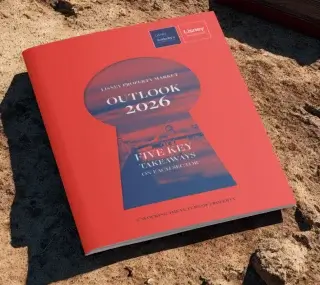read also
 Mortgage Approvals in Ireland Slump Sharply in January
Mortgage Approvals in Ireland Slump Sharply in January
 Lisney Property Market Outlook: Irish Property Market Poised for Steady Growth in 2026
Lisney Property Market Outlook: Irish Property Market Poised for Steady Growth in 2026
 Inflation in Romania Slows to 9.6% but Remains Above Forecast
Inflation in Romania Slows to 9.6% but Remains Above Forecast
 Riots in Mexico Disrupt Air Links to Resort Destinations
Riots in Mexico Disrupt Air Links to Resort Destinations
 UK House Prices Stabilise After 2025 Slowdown
UK House Prices Stabilise After 2025 Slowdown
 Israel Housing Market Eyes a Reset in 2026
Israel Housing Market Eyes a Reset in 2026
Finland’s Parliament to Consider Bill Banning Real Estate Transactions for Russians

The Finnish government submitted a bill to parliament on February 6, 2025, proposing a ban on foreign real estate purchases. While the document does not explicitly mention specific countries, Defense Minister Antti Häkkänen emphasized that, given the current geopolitical situation, the legislation directly targets Russia, its citizens, and its companies.
The bill proposes prohibiting property purchases for nationals of countries that have violated another nation’s territorial integrity, sovereignty, or independence. The restrictions would apply to both individuals and legal entities. However, foreign nationals with permanent residency in Finland or another EU country would be exempt, provided they receive approval from the Finnish Ministry of Defense.
According to Finnish broadcaster Yle.fi, since January 1, 2020, Finland has required all non-EU and non-EEA buyers of local real estate to obtain prior authorization from the Ministry of Defense. This requirement also extends to companies and organizations registered in the EU but with at least 10% foreign ownership outside the bloc.
Similar restrictions were in place until 1993 when Finland shifted to regulating transactions primarily in border areas and for non-residents, regardless of nationality. After joining the EU in 1999, all restrictions were lifted. The tightening of regulations in 2019 was justified by national security concerns, and this reasoning has continued in subsequent years.
The new bill is also framed as a national security measure, specifically addressing the risks posed by foreign ownership of Finnish real estate—particularly by entities from countries engaged in aggressive foreign policies. Minister Häkkänen stressed that Russia remains a long-term security threat in Europe, with the potential to negatively impact the economy, infrastructure, business environment, supply chain reliability, and other critical sectors. "We have introduced this bill because we want to minimize all possible security risks for Finland," he stated.
Government Initiative and Legislative Background
The bill aligns with Prime Minister Petteri Orpo’s government program, which includes reviewing real estate acquisitions and ownership structures outside the EU and EEA to ensure compliance with regulatory requirements. A special working group was formed in summer 2024 to develop new legal adjustments. By autumn, officials had confirmed that the bill was ready, although Russia was not explicitly mentioned in the text to avoid potential accusations of human rights violations. However, during discussions, the term “neighboring country” was frequently referenced. The draft legislation has been aligned with international legal frameworks and Finland’s constitution, increasing the likelihood of its approval.
Minimal Impact on the Real Estate Market
The proposed law is unlikely to cause significant disruptions in Finland’s real estate sector, as Russian buyers now represent only a small share of transactions. According to the National Land Survey of Finland, the peak year for real estate purchases by Russian citizens was 2008, with 907 transactions, followed by 698 in 2007. Between 2009 and 2012, Russian buyers signed approximately 500–600 deals annually. However, the numbers declined sharply in subsequent years:
2013 – 387 transactions
2015 – 147 transactions
2018 – 124 transactions
2021 – 182 transactions
2022 – 296 transactions
2023 – 107 transactions
2024 – 82 transactions
The steady decline reflects several contributing factors, including entry restrictions, a new law allowing property confiscation for unpaid utility and other fees, and the full closure of Finland’s border with Russia. Since July 8, 2024, Finnish authorities have been empowered to seize properties from absentee owners who accumulate debts, arguing that unpaid dues place undue financial burdens on local housing associations. These measures, alongside geopolitical tensions, have driven a significant sell-off by Russian property owners. Nevertheless, as of 2024, around 3,000 properties in Finland were still owned by Russians.
Authorities Already Blocking Real Estate Transactions
Even without an outright ban, Finnish authorities have been actively preventing property purchases by Russian nationals. For example, in December 2024, the Ministry of Defense denied a purchase request in the city of Parainen, located in the Turku Archipelago, as well as in Kokemäki, in the Satakunta region, citing the fact that the buyers were not citizens of EU or EEA countries. In August 2024, a 61-year-old businessman holding dual Swiss and Russian citizenship was denied permission to buy property. Similar rejections have been issued to other foreign nationals attempting to acquire real estate in Finland.
While Finland tightens regulations, Georgia has taken a contrasting stance, actively encouraging foreign investment in real estate. In 2024, Georgia streamlined property ownership procedures for foreigners, reducing bureaucratic hurdles and offering long-term residency permits for buyers. As a result, foreign real estate investment surged—particularly from Russia, Turkey, and Israel—boosting local economic activity. The Finnish model prioritizes national security concerns, whereas Georgia leverages real estate as a tool for economic growth and international partnerships.
The Finnish government’s proposed restrictions reflect a broader trend in Nordic and Baltic countries of increased scrutiny over foreign real estate acquisitions, particularly from Russian nationals. However, this policy contrasts with more investment-friendly approaches in countries like Georgia, which use real estate sales to attract foreign capital. While Finland sees national security risks in foreign property ownership, others view it as an economic opportunity—highlighting the diverging priorities shaping real estate policies across different regions.


